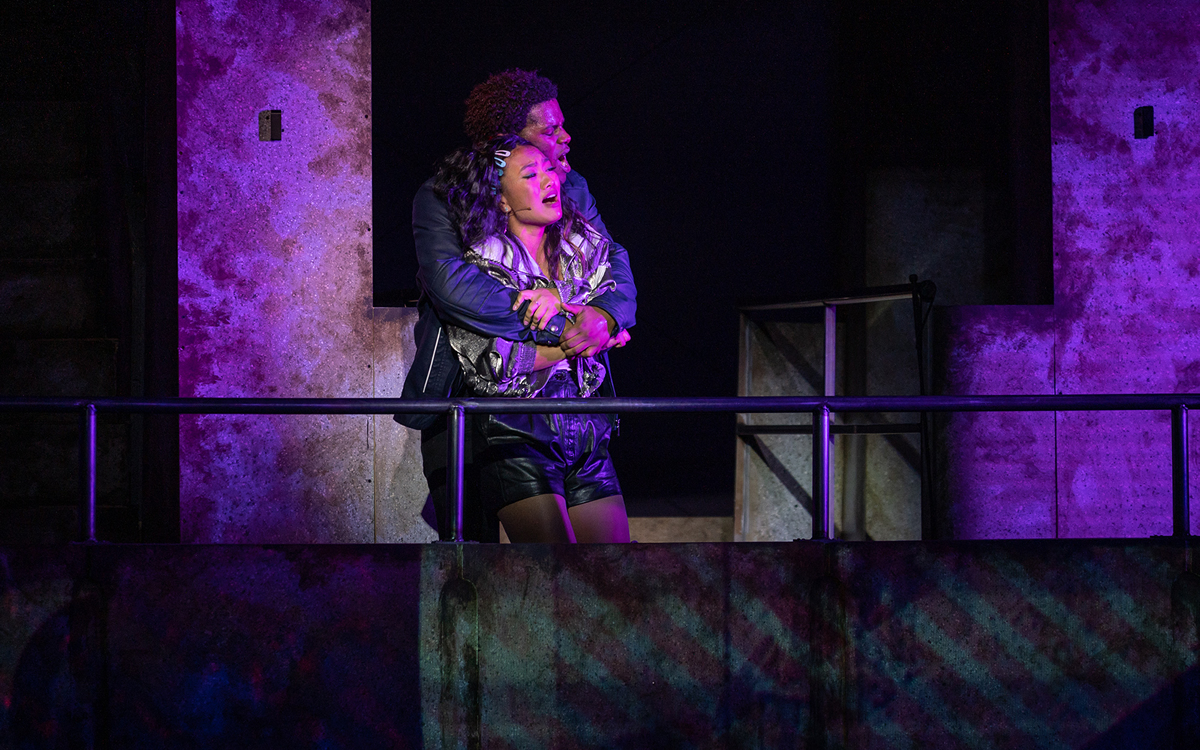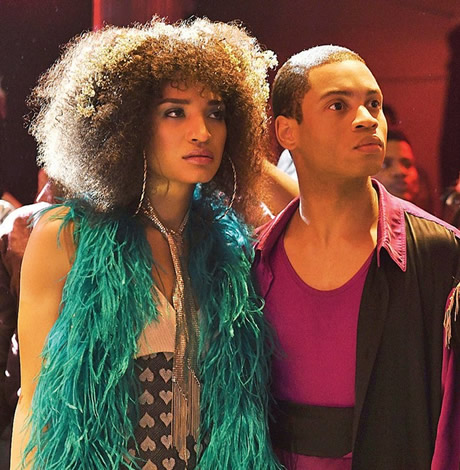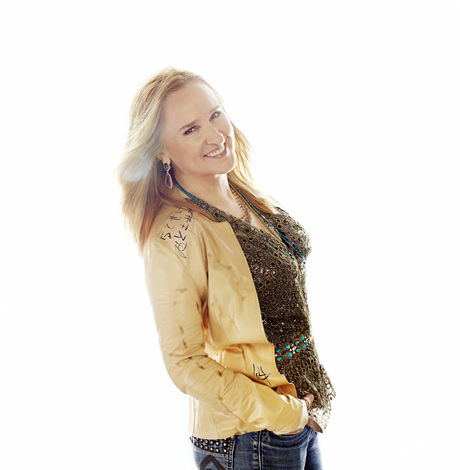Arts & Entertainment
Queer creator blends Shakespeare with iconic music of Pat Benatar
Could LA’s production of ‘Invincible’ make it to Broadway?

For millions of GenX-ers, the music of Pat Benatar and Neil Giraldo – Benatar’s longtime lead guitarist, collaborator, and producing partner, and her husband since 1982 – has been an iconic generational touchstone for more than four decades. This might be especially true for queer GenXers, who found inspiration during their formative years in the defiant spirit that resonated through many of the duo’s songs.
One of those queer GenXers was Bradley Bredeweg, the out co-creator of another queer touchstone, television’s “The Fosters,” which became a hit for five seasons on FreeForm with its story of a lesbian couple raising five adopted children. Now, Bredeweg – a self-described “theater kid” – is helping to bring Benatar and Giraldo’s music to a new generation of rebellious youth with “Invincible,” a new musical that intricately weaves the couple’s legendary catalogue with inspired new songs to re-imagine Shakespeare’s “Romeo and Juliet” for the 21st century.
“When I got into writing for television, I realized that I missed the equal exchange that happens between the people on the stage and the audience,” explains Bredeweg, who spoke with the Blade ahead of his show’s Nov. 22 opening at Beverly Hills’ Wallis Center for the Performing Arts. “I love film and television, obviously, I’m so grateful for it, but after a couple of years of doing it, I was like, ‘I miss that inner theater child, so I’m gonna moonlight.’”
The result of his “moonlighting” turns Shakespeare’s classic Verona setting into a modern, war-torn metropolis, and places his timeless tale of star-crossed lovers in a time of great transformation. Love and equality are forced to battle for survival as a newly elected chancellor works to return the city to its traditional roots and destroy a progressive resistance that is trying to imagine peace in a divided world – and if you think that sounds familiar, it’s by design. Its current run at the Wallis is its world premiere, but if things go as hoped, this is just the first step toward Broadway.
According to Bredeweg, however, it’s far from the beginning of his show’s journey.
“About 12 years ago, I realized I hadn’t read ‘Romeo and Juliet’ since high school and decided to read it again,” he tells us. “The next day I had to take a road trip – this was back in the era when I still had a CD book in my car – and I came across the “Best of” album of Pat Benatar and Neil Giraldo, so I popped it in and started driving. And because the story was obviously fresh in my head, I was listening to all these songs and realizing that if you line them up a certain way they totally tell the tale of ‘Romeo and Juliet.’ I wrote a first draft a couple of weeks later and then I just put it away and forgot about it.”
Much later, in 2015, he walked into a Los Feliz bar called the Rockwell (“It was this really cool kind of spot that we don’t have a lot of in LA, because we’re not a theatrical town”), where cabaret performances were sometimes mounted by visiting Broadway talent and Jeff Goldblum would do a gig every Wednesday night. Inspired by the vibe, he suddenly remembered, “this thing I had come up with all those years ago” and impulsively pitched the idea of putting it on to the bar’s manager. I said, ‘I’ve got this crazy idea where I want to combine Shakespeare with Pat Benatar,’ and she said, ‘That’s insane, but I’m a huge fan of your show and I love it, so let’s do it.’”
This early incarnation (then called “Love is a Battlefield”) was an unprecedented hit, enjoying a six-month run to sold out houses – that is, until Benatar and Giraldo’s manager attended a performance and recorded a video of the whole thing on his iPhone. He showed it to Benatar and Giraldo, and they were intrigued; but at the time, unbeknownst to Bredeweg, they were working on developing their own life story as a musical using their songs, so they sent a “cease and desist” letter to the Rockwell and the show was forced to shut down.
“It was heartbreaking, for all of us,” says Bredeweg, “because we knew we had something with real potential.”
Then, a year later, he got a call from a producer who told him Benatar and Giraldo wanted him to come to New York and discuss his musical.
“Of course, I said yes and got myself there immediately. We took a meeting on their tour bus, and we started talking about the musical they were developing, and suddenly we all started to move in the direction of doing ‘Love is a Battlefield.’ By the end of it we were all laughing about how we had started out with a ‘cease and desist’ order and here we were talking about coming together to do a show.”
In part, says Bredeweg, the couple was convinced to change course by their discussion of the proliferation of so-called “jukebox musicals” that have increasingly populated Broadway in recent years.
“We talked about how they have a shelf life, especially if they’re focused on a specific artist. They have a built-in audience, but beyond that, how can they stand the test of time? The real test of a timeless musical is if, in 40 years, every high school is doing it. I think that’s why we went back to using their iconic music to reinvent this epic, timeless tale.”
Another part of the appeal was how aptly the couple’s songs fit into Shakespeare’s classic – a coincidence, perhaps, but one that might be better described as synchronicity.
“When Pat and Neil met back in the late ‘70s it was supposed to just be a working relationship, but they fell head over heels in love with each other,” Bredeweg says. “When I got close to them, they told me they had been called the ‘Romeo and Juliet of the music world’ because the labels and managers and PR people were trying to break them up. They wanted Pat to stand on their own and Neil to just be her producing partner, and so much of what the two of them were creating at that time was about that struggle, about fighting that music industry system and saying, ‘let us figure this out for ourselves.’ That’s why so much of their music works inside of this story.”
For Bredeweg, the chance to realize his vision struck an intensely personal chord, too.
“I was always obsessed with the classics, but as a gay kid growing up in the ‘80s, I knew I felt different from everyone else, and as much as I loved them, I couldn’t really ‘attach’ to any character inside them. Nothing felt familiar to me, everything was from the point of view of a white cisgender person – and I always had these dreams, if I ever had any say, that I would love to tackle these classics in a different way and reposition them for a more diverse audience.”
In keeping with this mission, “Invincible” doesn’t just make Verona into a more modern city, but a more diverse one as well. The Capulet and Montague houses are run by the women, whose husbands are both dead; Romeo’s chum Benvolio is nonbinary, and falls in love with Juliet’s nurse; Juliet’s cousin Tybalt is secretly in love with her would-be husband, Paris; Paris himself is the city’s new chancellor, seeking the marriage as a means to control the vast Capulet fortune and deploy it to shore up his political power. In Bredeweg’s updated take on the tale, it’s a story about powerful men with powerful motives, with a matriarchy fighting against the traditional patriarchy and a younger generation trying to take control of its own destiny – and to ensure that it includes the freedom to love who they want.
“That’s obviously something the queer community can really understand,” says Bredweg. “We’ve been there and done that, the fight for marriage equality is all about that. It’s very much at the center of the show, and it was a big reason why I wanted to tackle the story, why I’ve rewritten so many characters with queer identities – taking these figures we thought we knew and giving them a more modern point of view.”
“Our culture is shifting in such huge ways,” he continues. “It goes back to my experience of not being able to find myself in these old tales. We are looking at our past, and pieces of art or the written world, or things in our politics, and we’re trying to reinvent these pinnacle moments in a way to make sure that history doesn’t always repeat, to move forward in different directions that are better for all of us. Especially the younger generations – they’ve stepped into this world where they’ve had no say in how chaotic things feel, and they are trying to take control of their identities and their path forward. That’s really what’s at the heart of our show.”
“Invincible” is not, of course, the first time “Romeo and Juliet” has been deconstructed and rebuilt as a musical; apart from the obvious example of “West Side Story,” the recent London import “& Juliet,” now a hot ticket on Broadway, presents an alternative version of the story in which the title character doesn’t kill herself, set to the music of pop songwriter Max Martin – responsible for hits from Britney Spears, the Backstreet Boys, NSYNC, and Céline Dion, among others.
Bredeweg isn’t worried about the competition.
“I never think about that kind of thing,” he tells us. “There’s always room for interpretation with classics of this stature. There’s space for both.”
His production, of course, has the added advantage of showcasing the music of two deeply beloved icons whose recent induction into the Rock and Roll Hall of Fame has catapulted their names back into the public arena in a big way – not that they were ever very far out of it.
For Bredeweg, though, the Benatar/Giraldo connection has always been much more than just a way to make his show marketable. It’s the whole reason “Invincible” even exists.
“Pat captured my heart as a young gay kid for obvious reasons. There was something about her music, and her energy and messaging.
“It made me feel that if someone as powerful as her could exist, then I could, too.”
“Invincible” continues its run at the Wallis until Dec. 18. For tickets and more details, visit their website.
Out & About
Plan your wedding the LGBTQ way
Washington D.C. LGBTQ+ Wedding Expo scheduled for Sunday

Rainbow Wedding Network will host “Washington D.C. LGBTQ+ Wedding Expo” on Sunday, March 1 at 12:30 p.m.
Guests can meet and mingle with a curated selection of LGBTQ-welcoming wedding professionals from across the region, each ready to help bring your vision to life, and spend a beautiful afternoon exploring everything they need to create a celebration that reflects them.
There will be a relaxed, self-guided look at the Watergate’s spaces and amenities, savor signature cocktails and delicious tasting samples, and connect with other couples who are on the same journey.
Visit Eventbrite to reserve a spot.

Friday, February 27
Center Aging Monthly Luncheon With Yoga and Drag Bingo will be at 12 p.m. at the DC Center for the LGBT Community. Email Mac at [email protected] if you require ASL interpreter assistance, have any dietary restrictions, or questions about this event.
Go Gay DC will host “LGBTQ+ Community Happy Hour Meetup” at 7 p.m. at Freddie’s Beach Bar and Restaurant. This is a chance to relax, make new friends, and enjoy happy hour specials at this classic retro venue. Attendance is free and more details are available on Eventbrite.
Trans Discussion Group will be at 7 p.m. on Zoom. This group is intended to provide an emotionally and physically safe space for trans people and those who may be questioning their gender identity/expression to join together in community and learn from one another. For more details, email [email protected].
Saturday, February 28
Go Gay DC will host “LGBTQ+ Community Brunch” at 11 a.m. at Freddie’s Beach Bar & Restaurant. This fun weekly event brings the DMV area LGBTQ+ community, including allies, together for delicious food and conversation. Attendance is free and more details are available on Eventbrite.
The DC Center for the LGBT Community will host “Sunday Supper on Saturday” at 2 p.m. It’s more than just an event; it’s an opportunity to step away from the busyness of life and invest in something meaningful, and enjoy delicious food, genuine laughter, and conversations that spark connection and inspiration. For more details, visit the Center’s website.
Black Lesbian Support Group will be at 1 p.m. on Zoom. This is a peer-led support group devoted to the joys and challenges of being a Black lesbian. You do not need to be a member of the Beta Kappa Chapter or the Beta Phi Omega Sorority in order to join, but they do ask that you either identify as a lesbian or are questioning that aspect of your identity.Send an email to [email protected] to receive the zoom link.
Sunday, March 1
LGBTQ+ Community Coffee and Conversation will be at 12 p.m. at As You Are. This event is for people looking to make more friends and meaningful connections in the LGBTQ community. Attendance is free and more details are available on Eventbrite.
Monday, March 2
“Center Aging: Monday Coffee Klatch” will be at 10 a.m. on Zoom. This is a social hour for older LGBTQ+ adults. Guests are encouraged to bring a beverage of choice. For more information, contact Adam ([email protected]).
Tuesday, March 3
Universal Pride Meeting will be at 7 p.m. on Zoom. This group seeks to support, educate, empower, and create change for people with disabilities. For more details, email [email protected].
Wednesday, March 4
Job Club will be at 6 p.m. on Zoom upon request. This is a weekly job support program to help job entrants and seekers, including the long-term unemployed, improve self-confidence, motivation, resilience and productivity for effective job searches and networking — allowing participants to move away from being merely “applicants” toward being “candidates.” For more information, email [email protected] or visit www.thedccenter.org/careers.
Center Aging Women’s Social and Discussion Group will be at 6 p.m. on Zoom. This group is a place where older LGBTQ+ women can meet and socialize with one another. There will be discussion, activities, and a chance for guests to share what they want future events to include. For more information, email [email protected].
Thursday, March 5
The DC Center’s Fresh Produce Program will be held all day at the DC Center for the LGBT Community. People will be informed on Wednesday at 5 p.m. if they are picked to receive a produce box. No proof of residency or income is required. For more information, email [email protected] or call 202-682-2245.
Virtual Yoga Class will be at 7 p.m. on Zoom. This free weekly class is a combination of yoga, breathwork and meditation that allows LGBTQ+ community members to continue their healing journey with somatic and mindfulness practices. For more details, visit the DC Center’s website.
a&e features
Transmission DC breathes new life into a storied sound space
A fresh home for boundary-pushing culture on H Street

Late last year, phoenix-style, a fresh home for boundary-pushing culture arose on the H Street corridor. Transmission DC – a queer, trans, and POC-owned, operated, and centered community-focused venue – powered on in the former home to the Rock & Roll Hotel (famously, not a hotel, but very much rock & roll). Transmission (1353 H St., N.E.) arrives secure in its mandate – or even birthright – to provide a place to celebrate creativity and music through a lens of inclusivity and respect.
Transmission’s team brings experience, but also representation. Owners/partners Kabir Khanna (who is also programming director), Katii B, Ellie McDyre, and Kelli Kerrigan together previously managed 618 productions, a venue in Chinatown, crafting “some of D.C.’s freakiest parties, raves, and mosh pits” they note.
They packed up operations last fall to a space curated specifically for D.C.’s underground music and culture scene, building their efforts in Chinatown to bring in more fans in queer and POC circles.
Transmission, Khanna points out, is built on DIY values. In the music scene, DIY means that promoters and organizers – often disconnected from the mainstream and part of marginalized communities – build shows and programs collaboratively, but independently from institutions, supporting each other as smaller, independent venues close. Here, Transmission aims to ensure that those putting together these underground inclusive shows have a more permanent and stable home, can have access to resources, and can provide more sustainable income to artists. “We’re trying to get more people to support and enjoy the music, and also give artists and organizers within the DIY community more structure and a larger cut,” says Khanna.
Khanna also notes that Transmission operates “under the principles of safety, inclusivity, and respect.” McDyre added that even at venues that claim inclusivity, that statement might not take place in practice. We’re “not just pitting up a rainbow flag,” says McDyre, but as some of the owners are trans and POC, audiences can see themselves reflected at the top.
Much like the DIY nature of the music community, the Transmission owners brought a DIY ethos to turning around their space.
In March 2020 – the height of COVID lockdowns – Rock & Roll Hotel suddenly shuttered, though not due to the pandemic; instead, the venue claimed that decreasing sales and increasing competition led to the closure. For 14 years, it was the central spot for cheap beer and lesser-known and celebrated acts. The space stood vacant for more than five years, until Transmission turned the power back on.
“When we got into the space, it was effectively abandoned for years,” says Khanna. “There was a ton of mold, and paint primer covering all surfaces. It was nearly falling apart.” Khanna noted that many music venues like this one, regardless of how well it was maintained, “get the shit kicked out of it,” given the nature of shows. The team called in mold removal contractors, ripped up most of the floorboards, and started fresh.
Transmission’s first floor is styled as a stripped-down black box: the better to take in the music. “It’s minimal on purpose to act as a canvas for set design and music,” without a specific aesthetic, says Khanna. Moving upstairs, the second floor has been opened up, removing some walls, and now has a larger dance area than the first floor. Beyond the first two performance levels, and a holdover from Rock & Roll Hotel, is the rooftop. Though without a stage, the rooftop space is filled with murals splashed across the walls, with a full bar. Transmission’s current capacity is 496, but the team is looking to grow that number. Transmission will also leverage the full kitchen that Rock & Roll Hotel operated, bringing in Third Hand Kitchen to offer a variety of food, including vegan and vegetarian options.
Khanna pointed out an upcoming show reflective of Transmission’s inclusive ethos: Black Techo Matters on Feb. 27. The event is set to be “a dynamic, collaborative night of underground electronic music celebrating Black History Month.” Khanna says that techno came from Black music origins, and this event will celebrate this genesis with a host of artists, including DJ Stingray 313, Carlos Souffront, and Femanyst.


















